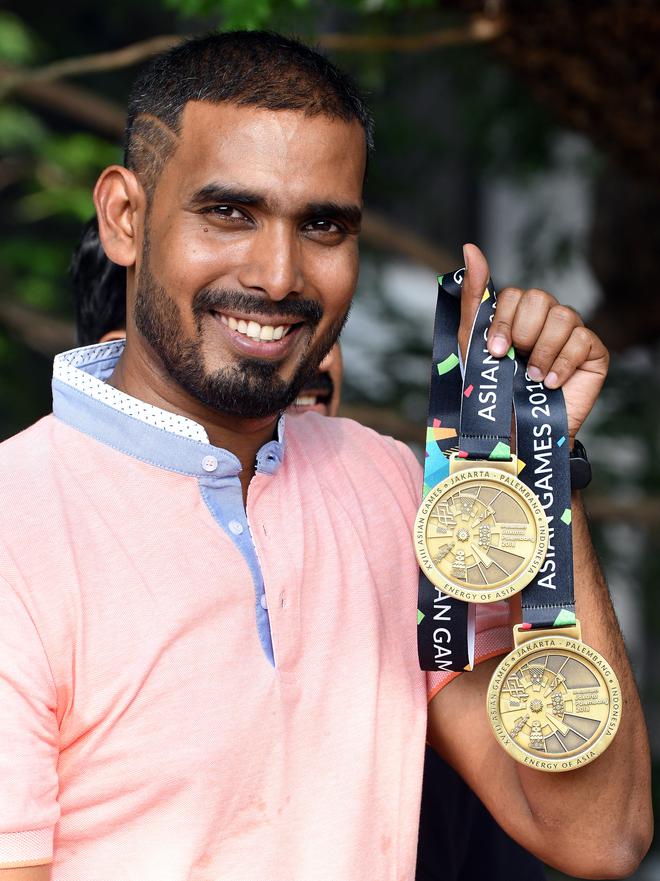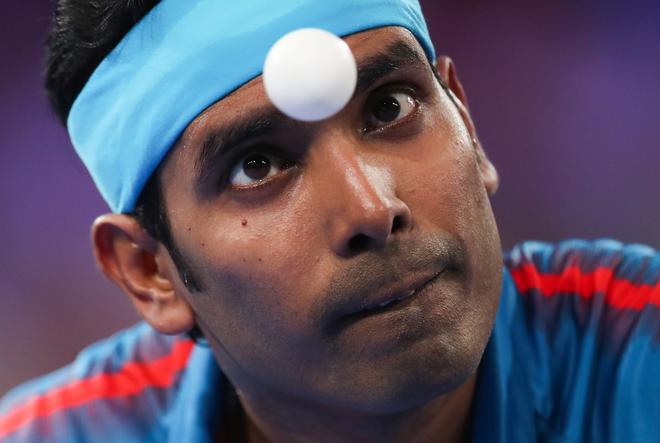

He has been the torch-bearer of Indian table tennis for almost two decades. At 41, A. Sharath Kamal is still setting his sights high. After impressing in season four of Ultimate Table Tennis and reclaiming the Inter-Institution singles crown this week, Sharath is eyeing a podium finish at the Asian Games, which begins in Hangzhou next month. In a freewheeling chat during UTT, he dwelt on the Asian Games’ importance, his future and the state of Indian table tennis. Excerpts:
Are you confident of repeating the Jakarta heroics [India won two medals] in Hangzhou?
The main goal is to get back those two [bronze] medals at least — team and mixed doubles. I can talk about teams. Mixed doubles, I can’t talk for them [G. Sathiyan and Manika Batra]. For me, it’s the teams. And it’s quite important because I guess the whole funding for the next cycle will depend on what’s going to happen now. And also it will be, let’s say, a litmus test for the Olympic Games. So if you are able to get a medal at the Asian Games, then we can confidently say that we could get a medal at the Olympic Games also.
How tough will defending the Asian Games team medal be?
Very, very tough. The draw plays a very vital part because we will be seeded 5 to 8. China — even the No. 2 team has a tough time beating them. And apart from that, there is Korea, Japan and Chinese Taipei… individual players, we have beaten them here and there, but as a team, three players collectively need to beat the three of them on that particular day. That is tougher.
The team selection has stirred a debate over the last few months. How do you look at it?
I am actually not looking at it so much. I am trying to stay away from it because I know that this is going to be one of my final years of playing the sport. Yes, I am saying it. A lot of people still believe I can go into, you know, the next few years. A lot of them are actually talking about LA [Los Angeles] 2028. But for me, it’s quite tough to keep up, especially mentally, and [my] personal life is also taking a hit. So for me, it’s like, ‘OK, this is what I have at this point in time, so I need to get the best out of it’. One thing I have understood over the last few years is that controversies come, a lot of disturbance is created in the environment around the players, around the management and the only thing that can do is make you play bad. That’s a guarantee. So how I have tried to do better despite this is to stay away from all of it. Of course, I know what the situation is. People talk about it, but I try not to spend too much energy [on it]. At the same time, I am also an IOA [Indian Olympic Association] Athletes Commission member. These problems in table tennis are very small compared to the problems out there.
When you started, selection was mostly based on the opinions of one or two individuals. Now an Excel sheet could well decide the team. How do you strike a balance?
See, 2010 Commonwealth Games onwards, they formulated a decent plan or selection criteria — a points system which would give 50 points to the domestic ranking, 30 points to the international ranking, 20 points to the coach. It was quite effective and things were quite fair at that point in time. Today, the team selection, I would say, is not biased. But at the same time, the coaches’ inputs have to be given good weightage because the coach is not thinking for himself, he is thinking for the team. He is looking at developing the team. The coach has to be accountable, too.
Looking at the multiple sports sitting in the IOA, I can clearly see that everybody has a problem. You do this, that is a problem. You do that, this is also a problem. So people are less considerate these days. They just want to say, ‘This is not fair for me’. Are they even thinking about what they are talking? Ten years ago, nobody would even dare to speak against the federation. Now it’s come to the other extreme where I am just going to talk against the federation. You know, there is no balance, there is no compromise or collaboration where the players and the federation and the stakeholders are working in tandem, together.
So I feel that is a very grey area where the IOA and SAI [Sports Authority of India] will have to step in and … get things sorted with the federation and players.
Each federation will have a different selection criteria… I guess as authorities who are funding [the sport], some amount of accountability has to be there and this would be an important role. If they say, I am going to give 50% for my domestic weightage and only 30% for the international weightage, then you are pressuring people to play more domestic and the international ranking will not go up. So how do you find the balance?
If you give 40 and 40, is it good enough? Or like badminton, everybody goes and plays the international circuit? Nobody has a national ranking. So your national ranking tournaments are like, who are you doing it for? So that balance and understanding, the federation will have and they will have to explain it to the IOA and SAI because each game is different.
So to bridge that gap, do you think it’s high time Indian table tennis had either a General Manager or a High Performance Director, someone who can be the link between the players and the honorary office-bearers?
Yes, HPD is the need of the hour. There are a few posts which are the need of the hour. The coach, it’s been almost five years without a permanent senior head coach. We are doing makeshifts with the Indian coaches. Of course, [Table Tennis Federation of India secretary] Kamlesh [Mehta] sir is trying his level best to have Subhajit [Saha] and Mamata [Prabhu] as the national team coaches but they are doing an honorary job. So the involvement, the accountability, their responsibility, their amount of authority — everything is limited. So that becomes very, very tough. A coach of foreign expertise has to be there and the HPD, these are some musts. Not just national team head coaches, men and women, but a panel of coaches who … will be working with the Indian team for the next three to four years. Of course, Kamlesh sir is working in that direction, but we need to find a way where we are able to pay them. Of course the Asian Games will be very, very important for all of this, to get that funding from SAI.







